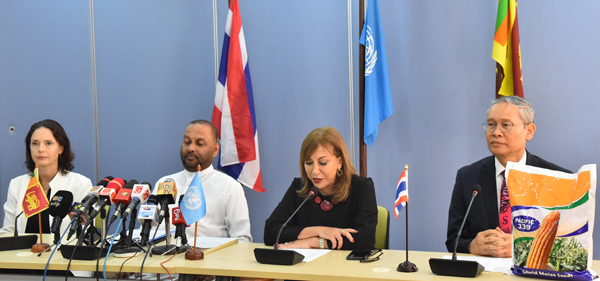Maize cultivation will have to be limited to 60,000 hectares in this Maha Season due to the inability to obtain the necessary quantity of hybrid seeds and fertilizers required for the crop, Agriculture, Wildlife and Forest Resources Conservation Minister Mahinda Amaraweera said.
This was stated by the Minister while accepting a contribution provided by the Royal Thai Embassy through the United Nations Development Programme (UNDP).
The government’s initial plan was to cultivate 100,000 hectares of maize in this year’s Maha Season to produce about 500 metric tonnes (MT) of maize.
“However, the required amount of 1,400 MT of hybrid seeds was not available in the country and had to go with 60,000 hectares with the available 625 MT quantity of seeds,” Minister Amaraweera said.
With the support of the Thai government, hybrid seeds for maize cultivation were provided for an amount of US$ 367,550 to cover the shortage of maize seeds to some extent.
“We hope to provide these seeds to low-income corn farmers. Earlier, we received a similar donation, based on a financial donation from the Japan International Cooperation Agency (JICA) under the leadership of UNDP,” Minister Amaraweera said.
Earlier, the JICA has provided funds to the Sri Lankn government for the purchase of 200 MT of corn seeds. The UNDP is currently managing the procurement process while JICA has made a monetary contribution of US$ 1.4 million in September with the concerns of rising malnutrition in the country.
After rice, maize is the second most important cereal, with an annual yield of 100,000 hectares. The country requires approximately 600 MT of maize per year for consumption and, more importantly for animal feed production.
“Though we have produced 350 MT of maize in 2019, the cultivation has dropped to 158 MT in 2022 due to Covid-19 impact, unavailability of chemical fertilizer and imported hybrid seeds,” Minister Amaraweera said.
He further stated that the government has allowed imports of a limited quantity of maize to meet the demand for a certain extent.
However, the current deficiency in maize production has badly affected the country’s livestock industry; due to this, prices of chicken meat and egg have gone up, Minister Amaraweera concluded.
Meanwhile, highlighting the role of the Thailand Government in contributing towards food security needs, Poj Harnpol,Thai Ambassador said that Thailand supports the concerted efforts of UN programmes to maintain sustainable livelihoods of the affected Sri Lankans.
“This contribution is one of the packages of Thailand's donation to Sri Lanka including medicines, medical supplies, food and financial support from both the government sectors as well as people from Thailand,” Mr. Harnpol concluded.

Leave Comments